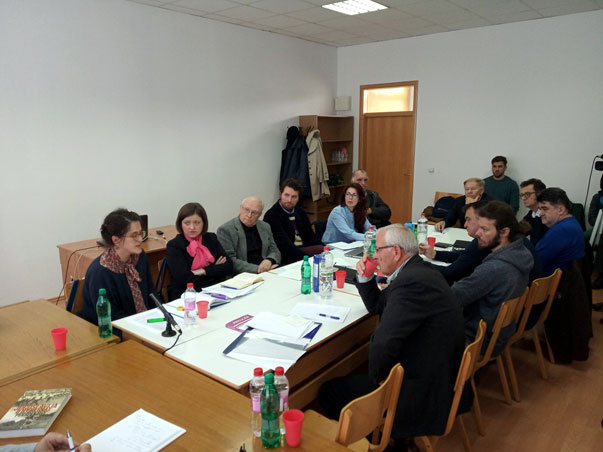|
ROUND TABLE
'Serbia’s
and Croatia’s Influence on Political
Processes in Bosnia-Herzegovina from
the 1970s onwards’
Sarajevo, November 14-15, 2019
In Media >>>

One of the two
round tables planned for the first
year of the three-year project
“Legacy of Yugoslavia and the Future
of the Region” was held at the
Sarajevo Faculty of Political
Sciences on November 14-15, 2019.
The project is
realized with the assistance from
the Embassy of the Federal Republic
of Germany, Belgrade.
* * *
The Sarajevo round
table under the title referred to
above assembled representatives of
Bosnia-Herzegovina’s academic
community.
The said
conference was meant to examine the
way in which Serbia and Croatia has
been influencing political processes
in Bosnia-Herzegovina since the
1970s and ensuing changes in the
stances of B-H leaderships.
“As members of the
academic community, we want to
analyze and expose the facts about
these developments, and our
understanding of the said
influences. I hope our debate would
provide the opportunity to today’s
policy-makers in Bosnia, as well as
to policy-makers for
Bosnia-Herzegovina, to learn a thing
or two,” said historian Husnija
Kamberovic.
Though
participants in the conference can
speak from the angle of
Bosnia-Herzegovina, they are fully
aware of all developments at
Serbia’s and Croatia’s political
arenas, and the origins of the two
state’s influence on
Bosnia-Herzegovina, he added.
In her opening
address to the conference, Draga
Bozinovic of the Helsinki Committee
said the main objective of the
project was to contribute to
regional normalization and
modernization, as well as to the
culture of memory resting on
fractography.
She explained that
such meetings assembling academics
and students of history, political
science, sociology and humanities
would be organized in university
centers in the countries emerging
from Yugoslavia.
The two-day
conference at the Faculty of
Political Sciences in Sarajevo was
divided into three panels covering
the periods the 1970s-1990s, the
1990s-2000, and 2000-2019.
|